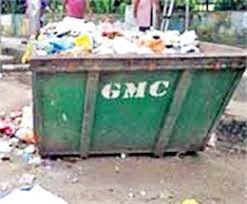HT Digital
Wednesday, October 2: The Guwahati Municipal Corporation (GMC) is facing severe criticism for its inadequate waste management and inability to address public grievances, particularly evident in the ongoing garbage crisis in Saukuchi. This situation has exposed the city’s struggles with effective waste disposal and has left residents increasingly frustrated with the lack of action from the municipal authorities.
In recent weeks, the garbage crisis has reached alarming proportions. Although the GMC has removed the makeshift garbage transfer station from the embankment road, residents in the affected areas are still dealing with an unbearable stench and streets littered with garbage. This ongoing problem is exacerbated by the absence of a sustainable drainage system and effective waste management protocols, leading to severe flooding each year that disrupts daily life in various parts of the city. Despite the corporation receiving substantial financial allocations for waste management, it has failed to implement a viable solution to this pressing issue.
The GMC’s decision to relocate the garbage dump to Saukuchi Road has only intensified the problem. This move has raised serious concerns regarding sanitation, hygiene, and public health in the area. Local residents have expressed their frustration, feeling abandoned by the GMC’s actions. One resident remarked, “It’s not like the problem has been solved; they’ve just moved the mess from one place to another.” Such sentiments reflect a growing discontent among the community regarding the corporation’s inability to address the core issues at hand.
The residents are understandably upset, with some commenting on the sheer incompetence required for a municipal authority to neglect such significant issues that directly impact their daily lives. “Imagine how incapable an authority has to be to stall such important issues that affect the daily lives of the residents,” one local resident stated. “We have been waiting for a proper garbage management system for years now, and all they’ve done is relocating the problem.” This highlights a significant disconnect between the GMC and the citizens it serves, further aggravating the crisis.
Moreover, comparisons to other Indian cities have emerged, with many residents pointing out how cities like Indore have successfully established clean and efficient waste management systems. “Cities like Indore have managed to establish clean and efficient waste management systems, yet here in Guwahati, we’re still stuck with this mess,” remarked another citizen, encapsulating the frustration felt by many. “It’s embarrassing that our capital city can’t even handle basic sanitation.” These comparisons underscore the urgent need for the GMC to take decisive action in addressing the waste management crisis in Guwahati.
The GMC’s history of inefficiency in waste management raises serious concerns about its ability to tackle the current garbage crisis. The corporation has previously faced complaints regarding similar issues in Bharalumukh, where residents reported a broken garbage collection system that left them with no viable means of disposing of waste. The repeated failure to address critical sanitation problems highlights a troubling trend of negligence that continues to affect the quality of life for Guwahati’s residents.
As frustration grows, citizens are calling for immediate action and accountability from the GMC. Many are demanding a comprehensive waste management strategy that goes beyond merely relocating garbage from one location to another. This includes establishing a sustainable drainage system and ensuring regular garbage collection services to prevent the accumulation of waste in public areas.
The ongoing garbage crisis in Saukuchi serves as a stark reminder of the pressing need for effective governance in waste management. The residents of Guwahati deserve a clean and healthy environment, and the GMC must rise to the occasion to meet these expectations. By learning from successful models implemented in other cities, the corporation has the opportunity to reform its waste management practices and regain the trust of the community.
In conclusion, the inefficacy of the Guwahati Municipal Corporation in managing the city’s waste crisis has been laid bare through the ongoing issues faced in Saukuchi and other neighborhoods. It is imperative for the GMC to take concrete steps toward implementing an effective waste management system that prioritizes the health and well-being of its residents. The public’s frustration is palpable, and only through decisive action can the corporation hope to restore faith in its ability to serve the community effectively. With the eyes of the city upon them, the GMC must take this opportunity to turn the tide on waste management and provide the citizens of Guwahati with the clean and hygienic environment they deserve.







